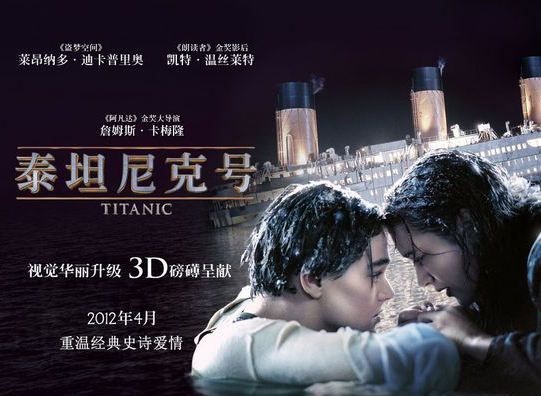According to Entgroup figures, TITANIC 3D made RMB 467 million in its first six days in Mainland Chinese cinemas (another chart puts it at 468, but let’s not nitpick, alright?). If the other box office chart I’ve read is accurate, that means it’ll overtake MISSION: IMPOSSIBLE - GHOST PROTOCOL’s RMB 678.9 million take to become the highest-grossing film of 2012. Considering that it also beat the 438 million record set by TRANSFORMERS 3 (which ended up making RMB 1.11 billion), we’d looking at it breaking AVATAR’s RMB 1.39 billion record if Fox didn’t already announce that they’re pulling the film by May 20th.
And Hollywood’s not done yet. BATTLESHIP and the second GHOST RIDER movie are opening this weekend, and THE AVENGERS will replace those screens on May 5th. With the May Golden Week holiday, it’s guaranteed that these three films (plus TITANIC) will be rolling in the dough.
Considering that last year’s Golden Week brought THE LOST BLADESMAN and CHINESE GHOST STORY - both of which made over RMB 100 million - The Chinese film industry must have something powerful to counter the Hollywood invasion, right?
Not really.
This year, China is offering three male-dominated films for the holidays: Ning Hao’s GUNS AND ROSES, the bandit-World War II action film AN INACCURATE MEMOIR, and Guan Hu’s dark comedy DESIGN OF DEATH. Though film buffs will appreciate the eclectic holiday choices this year, all three films are from young, less commercially-proven filmmakers who have never made a film that’s grossed more than RMB110 million (though MEMOIR star Huang Xiaoming is one of China’s best-known actors). Even if two of the three films have commercial elements (Japanese villains!), none of the three can be considered typical commercial material.
Which means none of them is going to beat THE AVENGERS.
However, they have even tougher problems to deal with, like booking screens and getting enough people to watch them to make profit. With three Hollywood giants around, there’s no guarantee that any of these films can even secure enough showings, let alone to sway audiences to choose them.
It’s not all hopeless though, as domestic films do have some advantage over Hollywood in terms of marketing. Some are already being used, and some can be utilized better.
Regional Advantage
It’s not likely that James Cameron or Robert Downey Jr. will be able to hit China to promote their films, let alone travel to first and second-tier cities. This is where Chinese stars and actors come in. With an actor like Huang Xiaoming leading AN INACCURATE MEMOIR (he’s also producing), he can be front and center of the publicity tour. The same can also apply to Ning Hao, who is being put front and center of the GUNS AND ROSES campaign. Considering that Huang Bo is in both GUNS and DESIGN OF DEATH, I don’t know what he’ll do.
However, the problem with this approach is that China is a BIG country, and an intense promotional tour through all the major markets can stretch the limits of both actors and the marketing team. Considering that they only make appearance with a limited number of audiences in each city, stars need to be exposed on a national level, and that problem with that is aside from CCTV, there are no national networks in China. Each province has their own network that are carried nationwide, but only several networks truly have a nationwide audience.
And even then, nationwide campaigns cost far too much, due to the skyrocketing cost of advertisements in China. Two weeks ago, Pang Ho-Cheung revealed that his China distributor for LOVE IN THE BUFF wouldn’t make any billboards for the film, and that the entire advertising campaign for his film involved an intense nationwide meet-and-greet tour and internet buzz. In their defense, Mei Ah China revealed that 100 billboards already cost RMB 1 million, and their share of the box office didn’t justify them having to spend the money.
Make sure your audience knows what your movie is about
With only a RMB 9 million budget, LOVE IS NOT BLIND couldn’t afford to take its stars on a nationwide tour. Even if they did (and they might have), it wasn’t the key to its RMB300 million-plus gross.
If you read the blog often, you’d know that I’d already written about the key to the film’s success. Since the film is about how a young woman gets over her traumatic break-up, the director not only intended on releasing the film in time for “singles day” (November 11th), its marketing team also went around the country and interviewed young people to recount their own experiences. The strategy worked so well for the film in China that distributor Edko made their own version of the video for the Hong Kong release (though the video wasn’t as good).
The lesson to learn here is that that team built a marketing campaign entirely around the subject of the film rather than a particular star or director. They knew which demographic to appeal to, and they knew how to appeal to them. With such a crowded market, knowing your target is especially important.
Right now, none of the three films have clearly stated what they’re about - GUNS is selling Ning Hao, MEMOIR is selling dirt and grit, while DESIGN OF DEATH is selling genre mash-ups. No on really knows what they’re in for when they pay up that extravagantly priced tickets, and that’s very dangerous for three not-so-typical blockbusters opening in a competitive period.
Still, it’s not like I know how to market any of these three films, because if I did, I’d be working for them, not writing a blog entry telling them what to do.
When all else fails….get the hell outta dodge
As I’d written above, none of the three films really have the pedigree of a holiday tentpole (possibly with the exception of GUNS AND ROSES). As my favorite anonymous Weibo film industry informant suggested, these films should really get out of the way or set a more suitable release date to begin with. Instead of a long holiday period, MEMOIR and GUNS might’ve stood a better chance during the summer or mid-May, where the fight is in long term rather than one specific period.
Then again, summer might even be tougher, as big guns like PAINTED SKIN 2, LAST SUPPER, many Hollywood blockbusters, and possible TAI CHI star invading the multiplexes.
The official box office battle stars when GUNS opens on the night of the 23rd. Stick with my Twitter to find out which films win, and which films will be crying their way out of the cinemas.
Let’s all go to the movies!
This entry was posted on Friday, April 20th, 2012 at 1:37 pm
and is filed under editorial, China, box office. You can follow any responses to this entry through the RSS 2.0 feed. Both comments and pings are currently closed.















